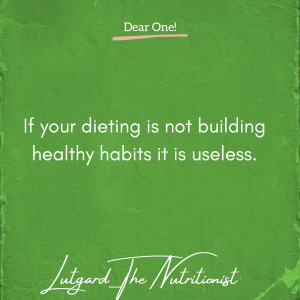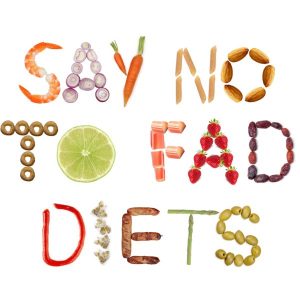“I am on a diet” should be one of the most misunderstood statements. Being on a diet translates to a weight loss program for many yet a diet simply refers to nutritional and lifestyle changes that a person makes to improve their health. We have many diets prescribed for medical reasons, like the DASH diet to control diabetes, a gluten-free diet for those with celiac disease, or a dairy-free diet for lactose intolerant people, to mention but a few.
Why most diets do not seem to work?
A friend of mine asked me an interesting question just days ago. “Why do I diet, lose weight only for it to come back?” I bet many out there keep wondering the same. Have you ever tried to lose weight by following a diet plan, focusing on certain foods while avoiding others, and had trouble sticking with it? Have you succumbed to your cravings by eating forbidden food or having a “cheat day”? Did you feel like you blew it or failed, which then led you to eat all of the foods your diet restricted?
While most weight-loss diets can help you lose weight, they may be unsuccessful over the long run for a number of reasons. Some people don’t follow their diets carefully and don’t lose much weight even from the start. Others may go off the diet entirely after a while because it’s too restrictive or the foods aren’t appealing. Some may engage in less physical activity as they consume fewer calories. But who hasn’t heard of someone doing everything right and still losing minimal weight, or regaining lost weight over time? Perhaps that someone is you.
A while ago I wrote an article titled “Weight is not an indicator of health” and many of the answers for this are in there but the long and short of it, if your diet is not building habits, you will find yourself in a frustrating cycle which will leave you feeling like a failure. Did you know that your weight is contributed by fat, bone density, and muscle? It is important to understand your body composition before focusing on the number on the scale. It is very possible to have two people who weigh exactly the same weight yet one of them has a healthy weight and the other doesn’t.

For the longest time in my practice, I am against restrictive diets and I always focus on building habits for my clients because I have proved beyond doubt that this approach is always a slow fix but a lasting one. What is a restrictive diet you may ask?
Restrictive dieting requires individuals to follow a specific set of rules regarding what they can eat and what they can’t eat. That may mean giving up carbs or fats, including healthy fats like those found in avocado or fish, attempting to never eat sweets or drink alcohol again, etc. it’s a diet that lures you into unhealthy habits in hopes it results in. Although it seems like a quick way to lose weight, it actually provides more harm than benefit. Starving yourself, eating less, and not consuming the correct amount of calories could result in more negative side effects that you were not prepared for.

Throw out the restrictive dieting and adopt a healthy lifestyle
A quick fix will give you results but not for long
People tend to lose weight quickly when they start a restrictive diet, which is why they are so popular. When entire food groups are eliminated, it typically results in overall decreased calorie consumption as the dieter figures out what they can actually eat, and anyone who burns more calories than they consume will lose weight. While fad diets might seem like the quick-fix solution to lose weight, they won’t help you get healthy in the long run. Individuals who commit to healthy, sustainable lifestyle changes may lose weight more slowly, but are more likely to keep it off. Learning how to eat well and taking the time to understand appropriate portions and the science of exercise is ideal and better; it may take some time, but with practice, you’ll internalize information and skills that will stay with you the rest of your life ensuring that even if you fall off, you’ll know what to do to get back up and keep going.
The focus should be on health other than the number on the scale
Commit to a well-rounded, healthy lifestyle, your nutrition, and exercise to help your body function at its best. A lot of restrictive diets focus on the aesthetic benefits of weight loss rather than the health benefits. When you cut out entire food groups or restrict calories too much, your body may not get enough of the essential nutrients it requires, which can result in things like headaches, fatigue, depression, or even lead to more serious health conditions. Should you begin experiencing any of I would advise you to talk to your consultant.
Remember a healthy lifestyle plan is all about achieving a sustainable balance that allows you to fuel your body to meet the demands of your life, build strength and achieve a physical appearance that you feel good about it. Do it with ease, there is no need for a crash course.
It is not about the Dos and don’ts
A set of dos and don’ts usually characterizes restrictive dieting. Do you ever wonder why our human nature is so much against rules or the law? We are hell-bent to break them all the time and the same thing happens to restrictive diets. It will always work as long as you are adhering and once you break them, you back slide and this has a way it works on your brain making you feel like a failure thereby plugging you into a state of depression for some. Other than following rules we need to understand or educate ourselves on why we are doing what we are doing. Attaching reason will help you appreciate a particular withdrawal of a particular food or addition and thereby cultivating a healthy habit in the long run.
In conclusion

As you diet, remember to be realistic and always work with an experienced professional. Ask as many questions as possible and do your own research before hopping onto some random diet. You are the only person who can have your best interests.
See you next Wednesday

Thanks for this helpful information.
I have always terrible at dieting and eating right.
May God help me to adhere.
Find what works for you my dear